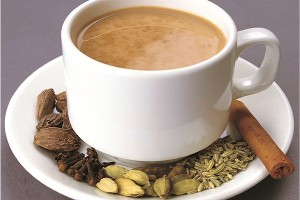Chai (pronounced as a single syllable and rhymes with ‘pie’) is the word for tea in many parts of the world. It is a centuries-old beverage which has played an important role in many cultures.
Chai from India is a spiced milk tea that has become increasingly popular throughout the world. It is generally made up of:
• rich black tea
• heavy milk
• a combination of various spices
• a sweetener
Contents
Uses
The spices used vary from region to region and among households in India. The most common are cardamom, cinnamon, ginger, cloves, and pepper. Indian chai produces a warming, soothing effect, acts as a natural digestive aid and gives one a wonderful sense of well being. It’s difficult to resist a second cup.
Benefits
A powerful blend of tea, herbs and spices, chai has been cherished for centuries in India to preserve health and increase peace of mind. But, the more we learn about chai, the more benefits we find. In addition to improving digestion, chai enhances the immune system, fights inflammation and has antioxidant properties. It has also been suggested that chai has antibacterial and anti-cancer effects.
Antioxidant
The antioxidant properties in tea are well known. Indiana University School of Medicine reports that the antioxidant effects of tea are not altered by caffeine or temperature. In an interview, Dr. James Klaunig, director of the Division of Toxicology and professor of pharmacology and toxicology at Indiana University School of Medicine, states supplements that contain tea are not as effective as tea consumed in a beverage. He goes on to say that it doesn’t matter whether your tea is caffeinated or decaffeinated. Whether you choose black, green or oolong tea for your chai, you’ll still benefit from a beverage rich in antioxidants.
Digestive Aid
Ayurveda asserts that poor digestion contributes to or causes many ailments. For that reason, strong digestion is vitally important. The Pacific College of Oriental medicine states that the basic spices in chai help stimulate, balance and support digestion. Cinnamon helps to calm the stomach and combat nausea and diarrhea. Ginger also soothes the stomach. Black pepper stimulates digestive fire as soon as it touches the taste buds. Cloves stimulate digestion. Fennel helps disperse flatulence.
Anti-inflammatory
With its powerful antioxidant properties, tea helps reduce inflammation. Chai tea’s anti-inflammatory star is ginger. Ayurveda frequently recommends ginger for inflammatory conditions like arthritis. In a paper published by the National Institutes of Health PubMed, Grzanna, Lindmark and Frondoza of RMG Biosciences state that recent research has proved the ancient belief that ginger is a powerful anti-inflammatory.
Reduced Caffeine
Chai tea provides a robust, satisfying beverage that can substitute for some of your daily coffee consumption. Caffeinated tea has less caffeine than coffee, and decaffeinated tea has almost none. Having chai instead of coffee provides health benefits and satisfies the taste buds.
Cautions
There are numerous benefits of chai tea but the big question is whether there are any side effects associated with this kind of drink. The simple answer to this question is yes. Some of the side effects of chai tea have been mentioned below:
1. Caffeine side effects
It’s no hidden fact that chai tea contains caffeine in it. The caffeine content in tea is more than in coffee. There are 100 mg of caffeine in 16 oz chai tea. If the caffeine content in chai tea is too much, dizziness, nausea and restlessness can be caused. Also due to much caffeine in the body, it’s difficult for a person to sleep. In rare cases, the blood pressure of a person can be raised by excessive caffeine consumption. You should limit the caffeine intake in chai tea. You can do this by avoiding black tea and using green tea for making chai tea because black tea contains more caffeine than green tea. You can also go decaffeinated chai to avoid caffeine.
2. Dangers for breastfeeding and pregnant women
Breastfeeding and pregnant women should be careful while consuming chai tea because it contains many spices and herbs. Many side effects can be caused by these herbs. The main herbs which you need to avoid during pregnancy include burdock, guarana, parsley, thyme, sage, uva ursi, damiana and comfrey. Avoid drinking the brand of chai tea which contains any of these herbs.
Interactions
None are recorded.
Other names
n/a
Reference
Source: LiveStrong, http://www.livestrong.com/article/23035-health-benefits-chai-tea/
Medlicker, http://medlicker.com/895-chai-tea

